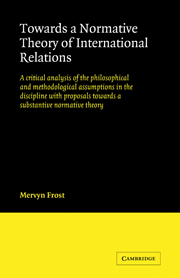 Towards a Normative Theory of International Relations
Towards a Normative Theory of International Relations Book contents
- Frontmatter
- Contents
- Acknowledgements
- Introduction
- PART ONE
- PART TWO
- CHAPTER THREE Normative issues in international relations: the domain of discourse and the method of argument
- CHAPTER FOUR Towards the construction of a normative theory of international relations
- CHAPTER FIVE Reconciling rights and sovereignty: the constitutive theory of individuality
- CHAPTER SIX The justification of unconventional violence in international relations: a hard case for normative theory
- Conclusion
- Bibliography
- Index
CHAPTER FOUR - Towards the construction of a normative theory of international relations
Published online by Cambridge University Press: 05 March 2012
- Frontmatter
- Contents
- Acknowledgements
- Introduction
- PART ONE
- PART TWO
- CHAPTER THREE Normative issues in international relations: the domain of discourse and the method of argument
- CHAPTER FOUR Towards the construction of a normative theory of international relations
- CHAPTER FIVE Reconciling rights and sovereignty: the constitutive theory of individuality
- CHAPTER SIX The justification of unconventional violence in international relations: a hard case for normative theory
- Conclusion
- Bibliography
- Index
Summary
The task of the present chapter, if done properly, would be a task for Atlas. As was shown in the previous chapter, what we are called upon to do in constructing a normative theory of international relations must involve at least the following steps. First, we must list all those norms in international relations that are considered settled in terms of the modern state domain of discourse. Second, we must attempt to construct the best possible background justification for this settled body of norms. Third, following through on step two, we must apply the procedure of reflective equilibrium. Fourth, with the aid of the background theory we must generate answers to some of the hard cases facing international relations theorists. Since none of us have the capacities of an Atlas we must rest content with something less, something altogether more schematic.
The settled body of norms in international relations
It is not possible to give a conclusive or very detailed account of what is the settled body of norms within the domain of normative international theory. At this stage a very rough and preliminary list will have to suffice. Since we are listing the parts of what is a settled whole, we must also expect that there will be some overlap between the listed items. The items are not clearly discrete.
I shall regard a norm as settled where it is generally recognized that any argument denying the norm (or which appears to override the norm) requires special justification.
- Type
- Chapter
- Information
- Towards a Normative Theory of International RelationsA Critical Analysis of the Philosophical and Methodological Assumptions in the Discipline with Proposals Towards a Substantive Normative Theory, pp. 120 - 160Publisher: Cambridge University PressPrint publication year: 1986
- 1
- Cited by
